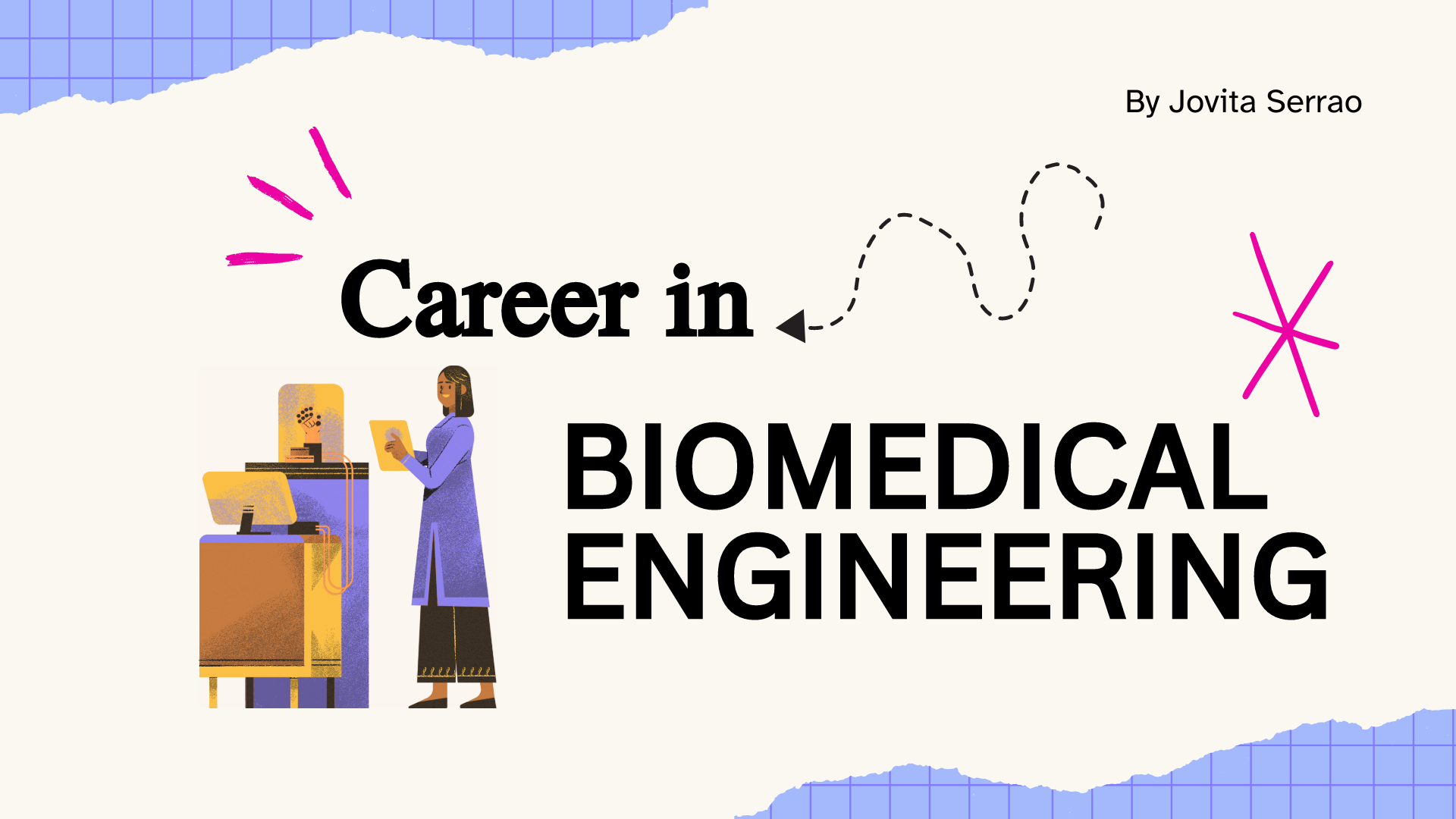
Pioneering Health Innovations: A Comprehensive Guide to a Career in Biomedical Engineering
Have you ever wondered how medical devices and technologies are designed to improve patient care? Are you fascinated by the intersection of medicine and engineering? Why should you consider a career in Biomedical Engineering? What specializations are available, and what does a typical day look like for a biomedical engineer?
This blog aims to answer these questions and more, providing a detailed guide for students in India on pursuing a career in Biomedical Engineering.
Why Choose a Career in Biomedical Engineering?
A career in Biomedical Engineering offers the unique opportunity to combine engineering skills with medical knowledge to develop technologies that enhance healthcare. Biomedical engineers work on designing and improving medical devices, diagnostic equipment, and therapeutic technologies. This field is ideal for those passionate about making a tangible difference in people’s lives through innovation and technology.
Specializations in the Career
Biomedical Engineering encompasses various specializations, including:
- Medical Device Design
- Biomaterials
- Biomechanics
- Clinical Engineering
- Biomedical Imaging
Day-to-Day Activities of a Biomedical Engineer
The daily activities of a biomedical engineer can vary based on their specialization and role but generally include:
- Designing and testing medical devices and equipment
- Conducting research to develop new technologies and improve existing ones
- Collaborating with healthcare professionals to address clinical needs
- Ensuring compliance with regulatory standards and safety protocols
- Analyzing and solving technical issues related to medical technologies
- Overseeing the installation and maintenance of medical equipment in healthcare settings
Eligibility Criteria
To pursue a career in Biomedical Engineering, candidates in India typically need:
Pathways After SSC (10th Grade):
- Enroll in a Diploma in Biomedical Engineering, which can be followed by lateral entry into the second year of a Bachelor’s degree program.
Pathways After HSC (12th Grade):
- Complete 12th grade with a focus on Physics, Chemistry, and Mathematics (PCM) or Biology.
- Qualify for entrance exams such as JEE Main, state-level engineering entrance exams, or specific exams for biomedical engineering programs.
Higher Education:
- A Bachelor’s degree in Biomedical Engineering (B.E./B.Tech).
- Advanced positions may require a Master’s degree (M.E./M.Tech) or PhD.
Job Opportunities
Biomedical engineers have diverse job opportunities in various sectors, including:
- Medical device and equipment manufacturers
- Healthcare institutions and hospitals
- Research and development organizations
- Biomedical consulting firms
- Regulatory agencies
- Academic and educational institutions
Salary
Salaries for biomedical engineers in India can vary based on experience, location, and specialization. On average:
- Entry-level engineers can expect to earn between INR 3 to 6 lakhs per annum.
- Mid-level professionals may earn between INR 6 to 12 lakhs per annum.
- Senior-level engineers and managers can earn INR 12 lakhs and above per annum.
Key Skills Required
To excel in Biomedical Engineering, one must possess:
- Strong analytical and problem-solving skills
- Proficiency in computer-aided design (CAD) and simulation software
- Excellent communication and teamwork abilities
- Project management skills
- Attention to detail and quality control
- Knowledge of medical regulations and standards
Industry Trend/Future Prospects
The future of Biomedical Engineering is promising, driven by trends such as:
- Development of advanced medical imaging technologies
- Growth in telemedicine and remote patient monitoring
- Innovations in wearable health devices
- Advances in personalized medicine and genomics
- Increasing use of artificial intelligence (AI) in healthcare
Options of Institutes
Top Institutes in India:
- Indian Institute of Technology (IIT) Bombay
- Vellore Institute of Technology, Vellore (VIT)
- Manipal Institute of Technology (MIT), Manipal
- National Institute of Technology, Rourkela
- Amity University, Noida
Top Institutes in Maharashtra:
- College of Engineering - [COEP], Pune
- Shri Ramdeobaba College of Engineering and Management - [RCOEM], Nagpur
- Vidyalankar Institute of Technology - [VIT], Mumbai
- Ajeenkya DY Patil University - [ADYPU], Pune
- Rajiv Gandhi Institute of Technology - [RGIT], Mumbai
Fees
The cost of a Biomedical Engineering program in India can vary widely:
- Diploma programs: INR 20,000 to 50,000 per year
- Bachelor’s programs: INR 1 to 2 lakhs per year in government colleges; INR 2 to 5 lakhs per year in private colleges
- Master’s programs: INR 1 to 3 lakhs per year
Scholarships/Loans
Many institutions offer scholarships and loans, such as:
- National Scholarships (e.g., MHRD scholarships)
- State Government Scholarships
- Institution-specific scholarships
- Education loans from banks and financial institutions
Experts from the Field
Hearing from industry experts can provide valuable insights:
- Dr. Sangeeta Bhatia, Ph.D. in Biomedical Engineering from University of California, San Diego. Currently the Director of the Laboratory for Multiscale Regenerative Technologies at MIT.
- Dr. Abhishek Bhattacharya, M.Tech in Biomedical Engineering from Indian Institute of Technology (IIT) Kharagpur. Currently the Lead Biomedical Engineer at GE Healthcare.
Summary
A career in Biomedical Engineering offers the chance to make a significant impact on healthcare through innovative technology and solutions. By developing the necessary skills and staying updated with industry trends, you can unlock numerous opportunities and contribute to advancements in medical technology. For personalized advice and guidance, feel free to reach out!
---
Author: Ms. Jovita Serrao
Position: Founder and Career Counselor, Career Pravaas
Contact Information: jovita.s@jetech.co.in
---
Stay tuned for more insights and guidance on various career paths. If you have any questions or need personalized advice, feel free to reach out!
---
Keywords: Biomedical Engineering, career in Biomedical Engineering, Biomedical Engineering specializations, day-to-day activities of Biomedical Engineers, Biomedical Engineering eligibility criteria, job opportunities in Biomedical Engineering, Biomedical Engineering salary in India, career progression in Biomedical Engineering, key skills for Biomedical Engineering, industry trends in Biomedical Engineering, top institutes for Biomedical Engineering in India, top institutes for Biomedical Engineering in Maharashtra, Biomedical Engineering fees, Biomedical Engineering scholarships and loans, experts in Biomedical Engineering
